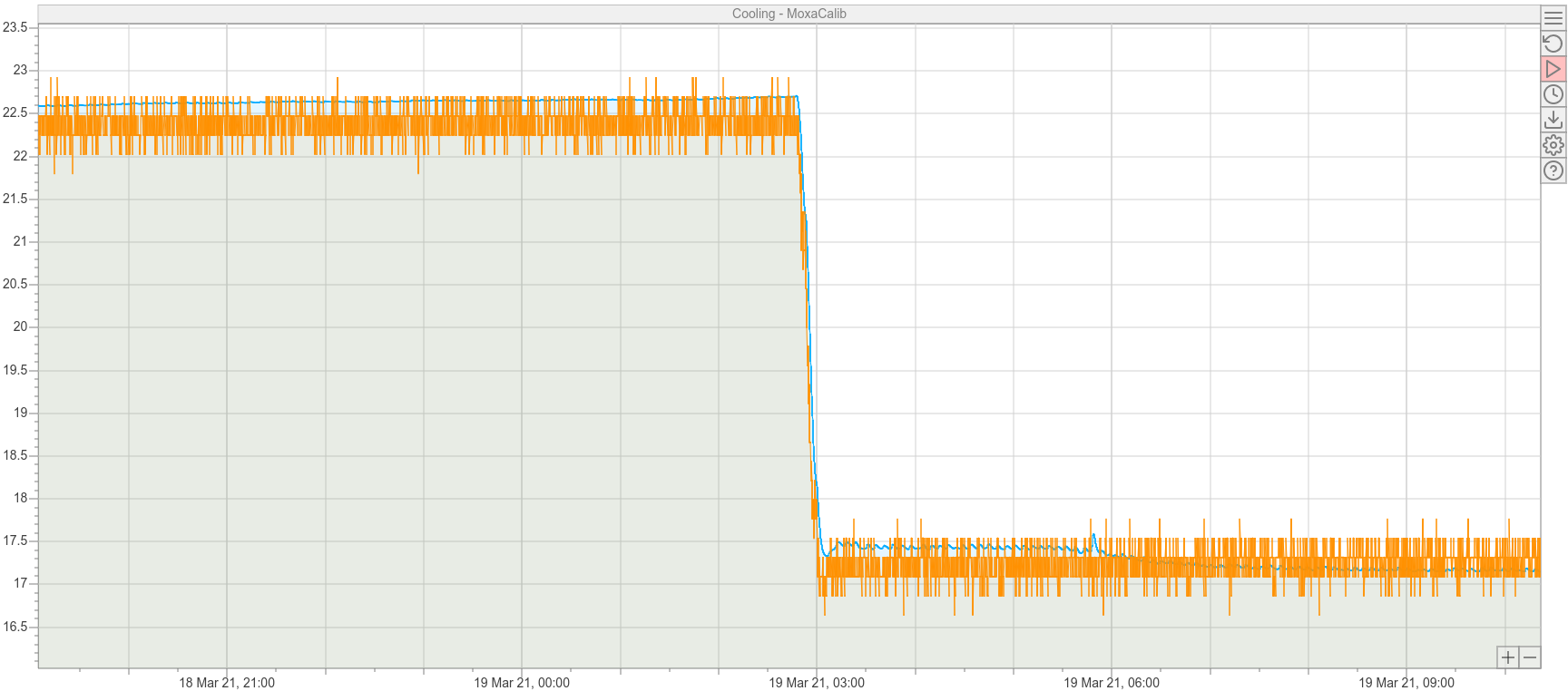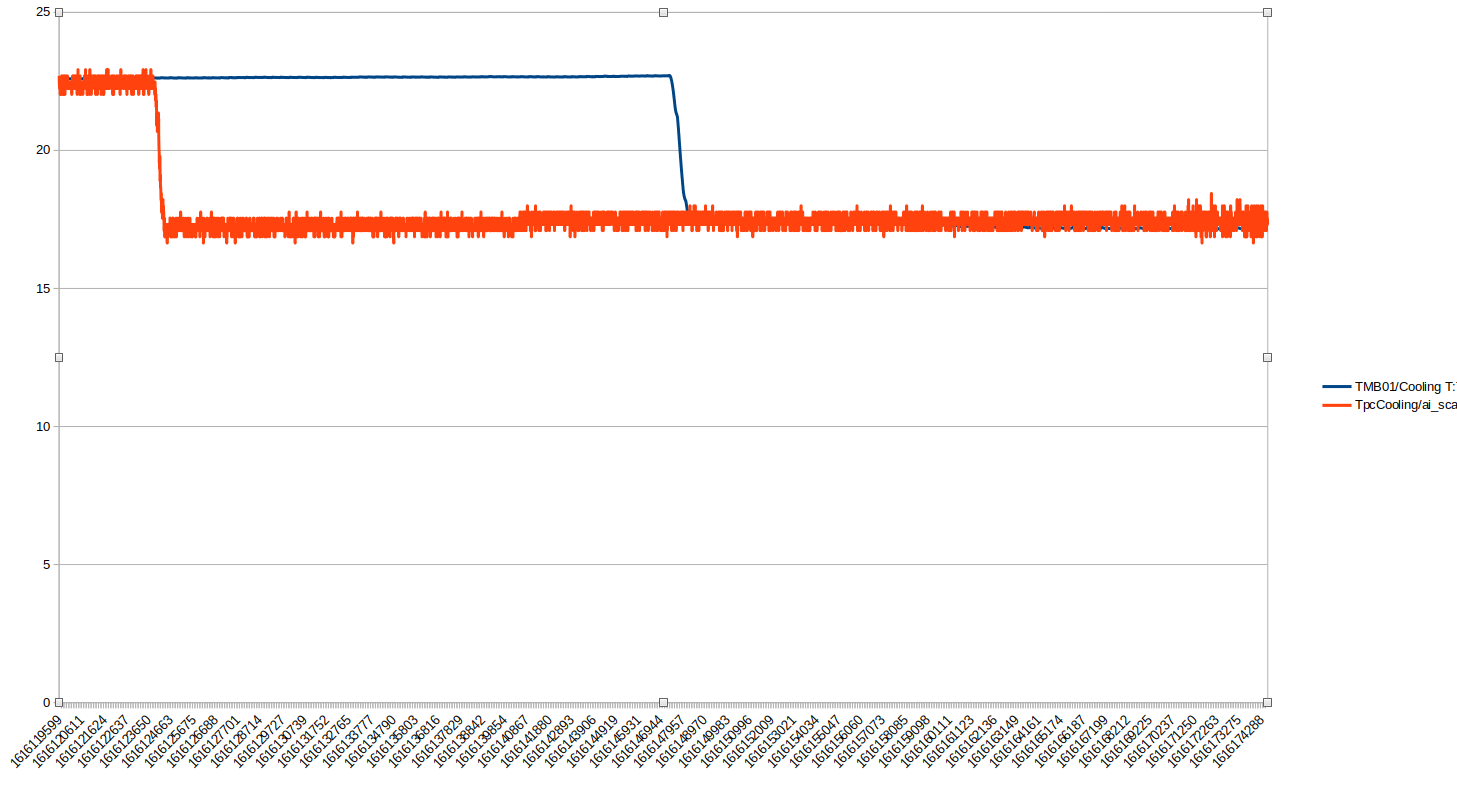| ID |
Date |
Author |
Topic |
Subject |
|
1397
|
24 Sep 2018 |
Lars Martin | Suggestion | Self-resetting alarm class |
I was planning to use the alarm system to display an information banner when a
certain valve is open, but I would like it to go away again when the valve is
closed.
Is there a way to achieve that? Maybe reset the alarm from an alarm script?
(Seems like a hack...)
Maybe this could be a useful feature, to be able to define an alarm class that
resets itself once the condition is no longer met? |
|
1849
|
06 Mar 2020 |
Lars Martin | Forum | RPC error |
I ported a bunch of frontends to C++ and now I'm occasionally getting this RPC
error message:
http error: readyState: 4, HTTP status: 502 (Proxy Error), batch request: method:
"db_get_values", params: [object Object], id: 1583456958869 method: "get_alarms",
params: null, id: 1583456958869 method: "cm_msg_retrieve", params: [object
Object], id: 1583456958869 method: "cm_msg_retrieve", params: [object Object],
id: 1583456958869
I'm assuming I'm doing wrong something somewhere, but does this message contain
information where to look? Does the ID mean something? |
|
1938
|
04 Jun 2020 |
Lars Martin | Bug Report | midasodb.cxx RBA appends instead of replacing |
I am on branch develop and use the tmfe frontends. I found that a bool vector
gets bigger every time I read it from the ODB.
Turns out in midasodb.cxx (as of commit 813f696, lines 478ff) the output vector
"value" gets appended to without resizing.
Since after line 474 xvalue.size()==value.size() it would make sense to simply
replace value->push_back() with value[i]= . |
|
2099
|
25 Feb 2021 |
Lars Martin | Bug Report | tmfe_main.cxx missing include <signal.h> |
The most recent commit (b43aef648c2f8a7e710a327d0b322751ae44afea) throws this
compiler error:
src/tmfe_main.cxx:39:11: error: 'SIGPIPE' was not declared in this scope
signal(SIGPIPE, SIG_IGN);
It's fixed by adding #include <signal.h> to that file. |
|
2100
|
25 Feb 2021 |
Lars Martin | Forum | TMFePollHandlerInterface timing |
Am I right in thinking that the TMFE HandlePoll function is calle once per
PollMidas()? And what is the difference to HandleRead()? |
|
2112
|
26 Feb 2021 |
Lars Martin | Bug Report | tmfe_main.cxx missing include <signal.h> |
> BTW, for production use I recommend midas from the "release" branches, unless one
> needs a bug fix or new feature from the development branch.
Fair point. I would suggest adding that recommendation to the wiki instructions. I
forget to add that step otherwise. |
|
2132
|
23 Mar 2021 |
Lars Martin | Bug Report | Time shift in history CSV export |
Version: release/midas-2020-12
I'm exporting the history data shown in elog:2132/1 to CSV, but when I look at the
CSV data, the step no longer occurs at the same time in both data sets (elog:2132/2) |
| Attachment 1: Cooling-MoxaCalib-20212118-190450-20212119-102151.png
|

|
| Attachment 2: Screenshot_from_2021-03-23_12-29-21.png
|

|
|
2133
|
23 Mar 2021 |
Lars Martin | Bug Report | Time shift in history CSV export |
History is from two separate equipments/frontends, but both have "Log history" set to 1. |
|
2134
|
23 Mar 2021 |
Lars Martin | Bug Report | Time shift in history CSV export |
Tried with export of two different time ranges, and the shift appears to remain the same,
about 4040 rows. |
|
2136
|
24 Mar 2021 |
Lars Martin | Bug Report | Time shift in history CSV export |
I think from my perspective the separate files are fine. I personally don't really like the format
with the gaps, so don't see an advantage in putting in the extra work.
I'm surprised the shift is this big, though, it was more than a whole hour in my case, is it the
time difference between when the frontends were started? |
|
2137
|
25 Mar 2021 |
Lars Martin | Bug Report | Minor bug: Change all time axes together doesn't work with +- buttons |
Version: release/midas-2020-12
In the new history display, the checkbox "Change all time axes together" works
well with the mouse-based zoom, but does not apply to the +- buttons. |
|
2144
|
09 Apr 2021 |
Lars Martin | Suggestion | Time zone selection for web page |
The new history as well as the clock in the web page header show the local time
of the user's computer running the browser.
Would it be possible to make it either always use the time zone of the Midas
server, or make it selectable from the config page?
It's not ideal trying to relate error messages from the midas.log to history
plots if the time stamps don't match. |
|
2227
|
21 Jun 2021 |
Lars Martin | Bug Report | ELog documentation inconsistency |
The documentation fro the Elog ODB tree here:
https://midas.triumf.ca/MidasWiki/index.php//Elog_ODB_tree#Url
says:
The Built-in elog will ignore this key.
If using an Built-in Elog, this key must NOT be present.
I assume this is an artifact from amending the documentation, but it's unclear if
the key has to be removed or not. I.e. if the key exists and is empty, will the
built-in elog work? In what way will it break? |
|
2304
|
01 Dec 2021 |
Lars Martin | Bug Report | Off-by-one in sequencer documentation |
The documentation for the sequencer loop says:
<quote>
LOOP [name ,] n ... ENDLOOP To execute a loop n times. For infinite loops, "infinite"
can be specified as n. Optionally, the loop variable running from 0...(n-1) can be accessed
inside the loop via $name.
</quote>
In fact the loop variable runs from 1...n, as can be seen by running this exciting
sequencer code:
1 COMMENT "Figuring out MSL"
2
3 LOOP n,4
4 MESSAGE $n,1
5 ENDLOOP |
|
2438
|
14 Oct 2022 |
Lars Martin | Suggestion | Allow onchange to refer to arbitrary js function |
Maybe this is already possible, I have a hard time understanding the mhttpd source code.
I would like to use a function defined in the <script> block of my custom page as an onchange callback.
Specific example:
I have an modbthermo that I would like to change to three different colours for "too cold", "just right", and "too hot" (measuring porridge, presumably). The examples only show the explicit (condition)?(val1):(val2) syntax, which doesn't allow more than two values, so I had hoped to replace
onchange="this.dataset.color=this.value > 40?'red':'blue';"
with something like
onchange="this.dataset.color=check_Temp(this.value);"
or
onchange="check_Temp(this.value, this.dataset.color);"
if that's easier somehow. The function itself would then return the colour string, or set the color argument to that string (I'm not sure if JS passes references or just values.)
Is this a possibility? |
|
2440
|
22 Oct 2022 |
Lars Martin | Info | Allow onchange to refer to arbitrary js function |
I figured I wasn't the first to have this idea.
Works great, thanks! |
|
2441
|
22 Oct 2022 |
Lars Martin | Suggestion | read_only odbxx? |
I really like the concept of the odbxx interface.
I think it would be a nice feature if one could have a read_only connection, e.g. by declaring a "const midas::odb".
Just for fun I tried if this already works, but the compiler doesn't allow const midas::odb for e.g. the [] operator. I'm guessing this would be non-trivial to implement, but I like the idea of certain Midas clients being able to read the odb without risking corruption. |
|
2442
|
22 Oct 2022 |
Lars Martin | Info | Allow onchange to refer to arbitrary js function |
Actually, now that I look again, there is a mistake in the instructions:
you say
onchange="this.dataset.color=check_therm(this)"
but check_therm doesn't return anything and instead changes the color itself. So you either want the function to return the string and use the above assignment, or use the function you provide and use
onchange="check_therm(this)" |
|
2444
|
26 Oct 2022 |
Lars Martin | Suggestion | read_only odbxx? |
> Having a "const midas::odb" probably does not work (at least I would not know how to implement that).
>
> But I could make an internal flag analog to the auto refresh flags. So you would have
>
> o.set_write_protect(true);
>
> to turn on write protection. Would that work for you?
Absolutely. Looking at the underlying code I was also at a loss how const would work.
I'm mostly just interested in having small clients that only read from the odb (for whatever reason) without risking corrupting it by messing something
up in the code, especially since such small clients are almost by definition hacked together quickly on the fly. |
|
3119
|
18 Nov 2025 |
Lars Martin | Bug Report | TMFeEquipment fEqConfReadOn not written to ODB |
I'm constructing a TMFeEquipment with this constructor:
MagnetFe(const char *eqname, const char *eqfilename) // ctor
: TMFeEquipment(eqname, eqfilename)
{
fEqConfEventID = 3;
fEqConfBuffer = "SYSTEM";
fEqConfPeriodMilliSec = 1000; // in milliseconds
fEqConfLogHistory = 1;
fEqConfReadOn = RO_ALWAYS;
}
When I start with a fresh ODB, the directories are created correctly, and e.g. the
event ID is set correctly, but "Read on" is set to 1 (i.e. RO_RUNNING) instead of
0xFF.
Now when I set it to 0xFF manually and restart, it gets overwritten to 7
(RO_NONTRANS), which I guess is a relatively recent change and doesn't affect me
negatively. |